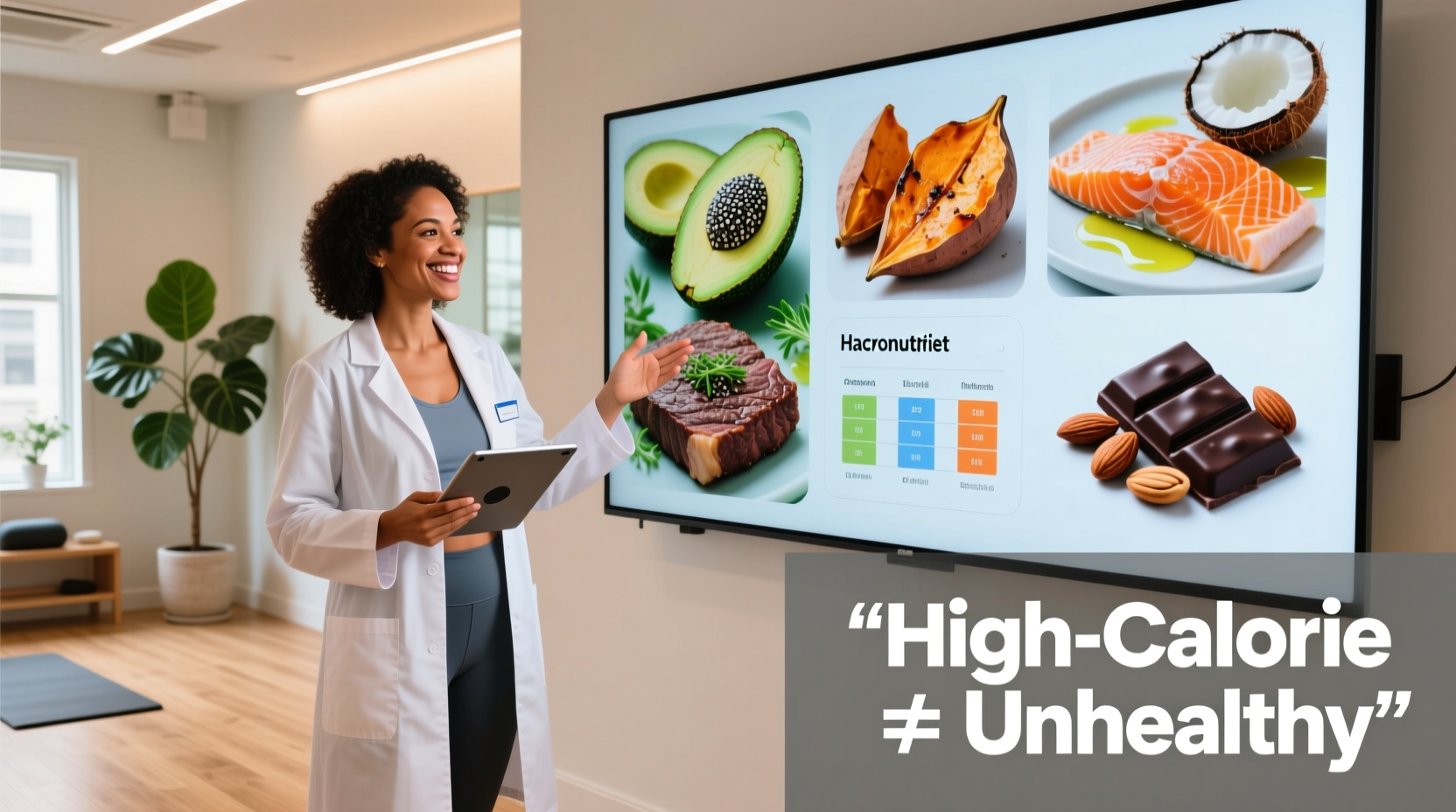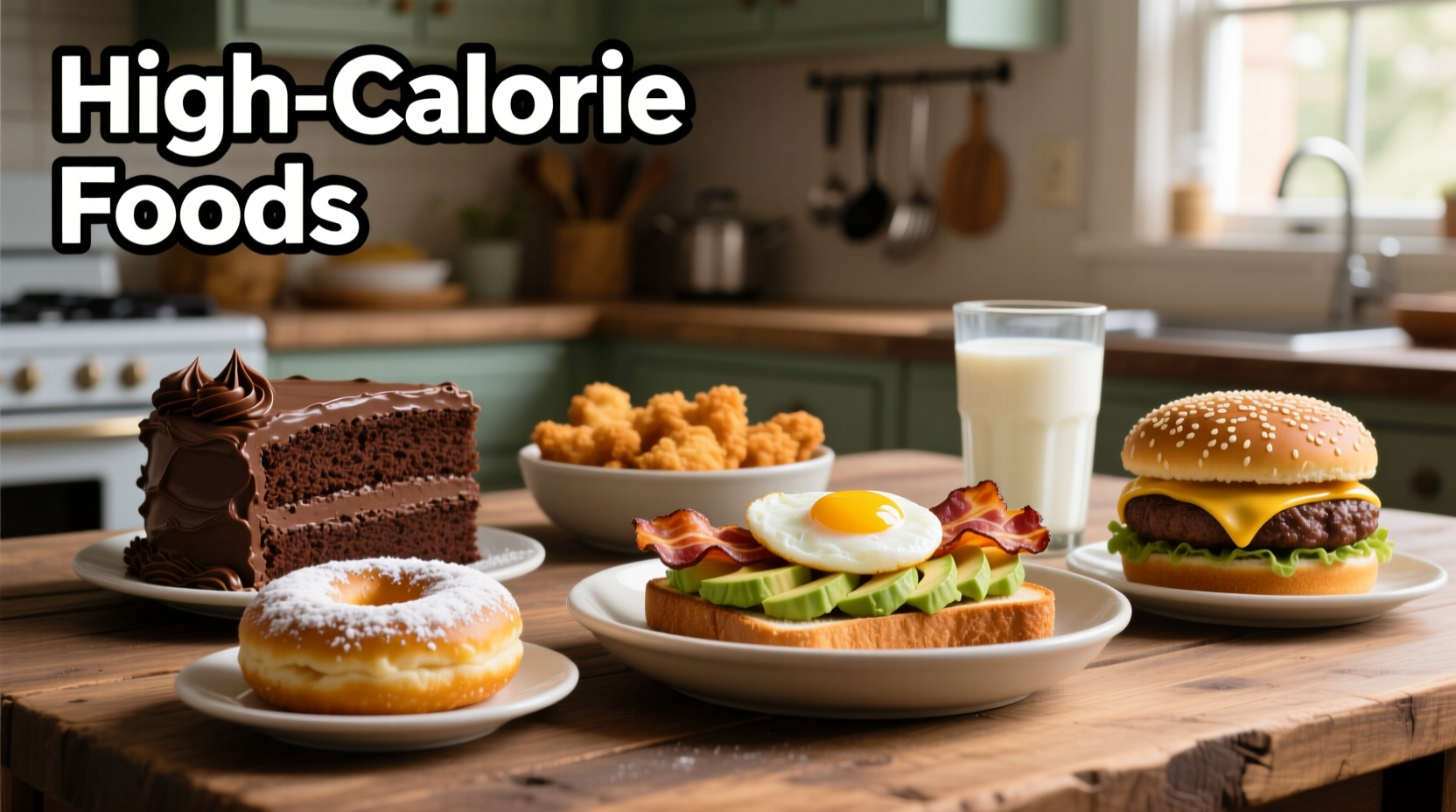The top high-calorie foods include oils (124 calories per tablespoon), nuts and seeds (160-200 calories per ounce), dried fruits (200-300 calories per 1/4 cup), full-fat dairy products, and fatty cuts of meat. Avocados, nut butters, and dark chocolate also rank among the most calorie-dense whole foods. Understanding which foods pack the most energy per serving helps athletes, underweight individuals, and those with high energy needs make strategic dietary choices.
When you're searching for what foods have high calories, you're likely looking for practical information to support specific health goals. Whether you're an athlete needing extra energy, someone trying to gain weight healthily, or simply curious about calorie density, this guide delivers evidence-based information you can trust. We've analyzed nutritional data from authoritative sources to provide a comprehensive overview of calorie-dense foods that deliver both energy and nutritional value.
Understanding Calorie Density: More Than Just Numbers
Calorie density refers to how many calories a food contains relative to its weight or volume. Foods with high calorie density pack substantial energy into small portions. While often viewed negatively in weight loss contexts, these foods play crucial roles for certain populations. According to the USDA FoodData Central database, foods deriving most calories from fats typically have the highest calorie density, as fat contains 9 calories per gram compared to 4 calories per gram for both protein and carbohydrates.
The evolution of our understanding of calorie density has shifted dramatically over the past century. Early 20th century nutrition science primarily focused on calories as energy units without considering nutrient density. Modern research, like studies published in the American Journal of Clinical Nutrition, now emphasizes evaluating foods based on both their caloric content and nutritional profile.
Top Calorie-Dense Foods Worth Knowing
Not all high-calorie foods offer equal nutritional benefits. The following table compares common high-calorie foods based on calorie content and key nutrients, using data from the USDA's National Nutrient Database:
| Food | Calories per Serving | Key Nutrients | Best For |
|---|---|---|---|
| Olive oil | 124 per tbsp | Monounsaturated fats, Vitamin E | Cooking, dressings |
| Almonds | 164 per oz (23 nuts) | Protein, fiber, Vitamin E, magnesium | Snacking, baking |
| Avocado | 240 per medium fruit | Healthy fats, fiber, potassium | Spreads, salads |
| Peanut butter | 190 per 2 tbsp | Protein, healthy fats, magnesium | Smoothies, toast |
| Dried dates | 277 per 3.5 oz | Fiber, potassium, magnesium | Natural sweetener |
When High-Calorie Foods Become Essential
For certain populations, high-calorie foods aren't just beneficial—they're necessary. Registered dietitians at Mayo Clinic recommend calorie-dense foods for individuals with:
- High energy expenditure (endurance athletes, physically demanding jobs)
- Medical conditions causing unintended weight loss
- Difficulty consuming large food volumes (elderly, children)
- Recovery from serious illness or surgery
Context matters significantly when evaluating high-calorie foods. While a tablespoon of oil contains substantial calories with minimal volume, it lacks the protein, fiber, and micronutrients found in nuts or avocados. The Academy of Nutrition and Dietetics emphasizes that for healthy weight gain, focusing on nutrient-dense high calorie foods yields better health outcomes than consuming empty calories.
Strategic Incorporation of Calorie-Dense Foods
Simply adding high-calorie foods isn't always effective. Consider these practical strategies:
- Enhance existing meals: Add avocado slices to salads, nuts to yogurt, or olive oil to cooked vegetables
- Smart snacking: Choose trail mix with nuts and dried fruit instead of processed snacks
- Smoothie boosters: Incorporate nut butters, full-fat Greek yogurt, or chia seeds
- Portion awareness: Measure high-calorie additions to avoid unintentional overconsumption
Research from Harvard T.H. Chan School of Public Health shows that individuals trying to gain weight healthily achieve better results when they focus on adding nutrient-dense calories throughout the day rather than dramatically increasing meal sizes. This approach improves adherence and provides sustained energy.

High-Calorie vs. Nutrient-Dense: Making Informed Choices
Not all high-calorie foods deliver equal nutritional value. The distinction between empty calories and nutrient-dense calories significantly impacts health outcomes. Consider these comparisons:
- Avocado vs. butter: Both high in calories, but avocado provides fiber, potassium, and heart-healthy monounsaturated fats
- Almonds vs. candy bars: Similar calorie counts, but nuts offer protein, fiber, and essential nutrients
- Full-fat Greek yogurt vs. ice cream: Comparable calories, but yogurt delivers substantial protein and probiotics
For athletes specifically, the International Society of Sports Nutrition recommends focusing on healthy high calorie snacks that combine carbohydrates, protein, and healthy fats to support performance and recovery. Their position stand emphasizes that strategic consumption of calorie-dense whole foods outperforms processed alternatives for long-term athletic development.
Practical Applications for Different Goals
Your approach to high-calorie foods should align with your specific objectives:
- Weight gain: Add 300-500 calories daily from nutrient-dense sources, focusing on consistent intake
- Athletic performance: Time calorie-dense foods around training sessions for optimal energy
- General health: Incorporate moderate portions of healthy high-calorie foods as part of balanced eating
Remember that individual calorie needs vary significantly based on age, gender, activity level, and health status. Consulting with a registered dietitian can help tailor these recommendations to your specific circumstances.
Frequently Asked Questions
What are the healthiest high-calorie foods for weight gain?
Nutrient-dense options like avocados, nuts, seeds, full-fat dairy, and olive oil provide calories along with essential nutrients. These support healthy weight gain without compromising nutritional quality, unlike processed high-calorie foods that offer empty calories.
How many high-calorie foods should I eat daily?
Individual needs vary, but most adults seeking weight gain benefit from adding 300-500 extra calories daily from nutrient-dense sources. Athletes may require more based on training intensity. Consulting a registered dietitian helps determine appropriate amounts for your specific goals.
Can high-calorie foods be part of a weight loss diet?
Yes, in moderation. Small portions of calorie-dense foods like nuts, avocado, and olive oil can enhance satiety and nutrient intake while supporting weight loss. The key is portion control and balancing these with lower-calorie, high-volume foods like vegetables.
Which high-calorie foods provide the most nutritional value per calorie?
Nuts, seeds, avocados, full-fat Greek yogurt, and fatty fish like salmon deliver exceptional nutrient density. These foods provide healthy fats, protein, fiber, vitamins, and minerals alongside their calories, making them superior choices to processed high-calorie options.











 浙公网安备
33010002000092号
浙公网安备
33010002000092号 浙B2-20120091-4
浙B2-20120091-4